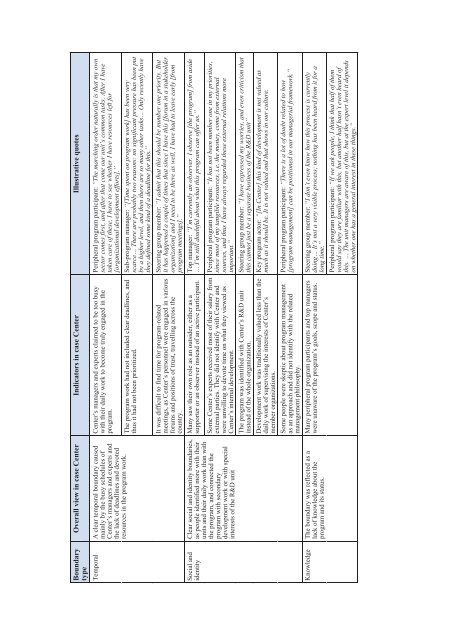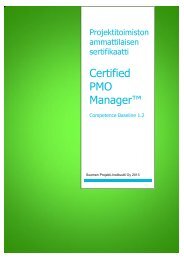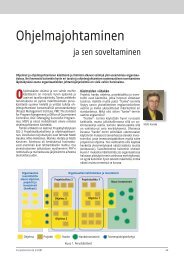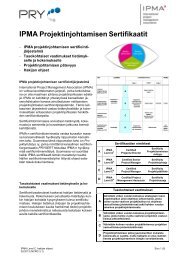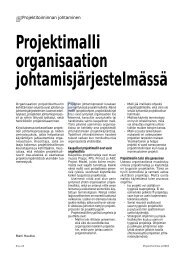Boundary activities and readiness for ... - Projekti-Instituutti
Boundary activities and readiness for ... - Projekti-Instituutti
Boundary activities and readiness for ... - Projekti-Instituutti
Create successful ePaper yourself
Turn your PDF publications into a flip-book with our unique Google optimized e-Paper software.
<strong>Boundary</strong><br />
type<br />
Overall view in case Center Indicators in case Center Illustrative quotes<br />
Temporal A clear temporal boundary caused<br />
mainly by the busy schedules of<br />
Center’s managers <strong>and</strong> experts <strong>and</strong><br />
the lack of deadlines <strong>and</strong> devoted<br />
resources in the program work.<br />
Social <strong>and</strong><br />
identity<br />
Clear social <strong>and</strong> identity boundaries,<br />
as people identified more with their<br />
units <strong>and</strong> their daily work than with<br />
the program, <strong>and</strong> connected the<br />
program with secondary<br />
development work or with special<br />
interests of the R&D unit<br />
Knowledge The boundary was reflected as a<br />
lack of knowledge about the<br />
program <strong>and</strong> its status.<br />
Center’s managers <strong>and</strong> experts claimed to be too busy<br />
with their daily work to become truly engaged in the<br />
program.<br />
The program work had not included clear deadlines, <strong>and</strong><br />
thus it had not been prioritized.<br />
It was difficult to find time <strong>for</strong> program-related<br />
meetings, as Center’s personnel were engaged in various<br />
<strong>for</strong>ums <strong>and</strong> positions of trust, travelling across the<br />
country.<br />
Many saw their own role as an outsider, either as a<br />
supporter or an observer instead of an active participant.<br />
Some Center’s experts received most of their salary from<br />
external parties. They did not identify with Center <strong>and</strong><br />
were unwilling to devote time on what they viewed as<br />
Center’s internal development.<br />
The program was identified with Center’s R&D unit<br />
instead of the whole organization.<br />
Development work was traditionally valued less than the<br />
daily work of supervising the interests of Center’s<br />
member organizations.<br />
Some people were skeptic about program management<br />
as an approach <strong>and</strong> did not identify with the related<br />
management philosophy.<br />
Many peripheral program participants <strong>and</strong> top managers<br />
were unaware of the program’s goals, scope <strong>and</strong> status.<br />
Peripheral program participant: “The marching order naturally is that my own<br />
sector comes first, <strong>and</strong> after that come our unit’s common tasks. After I have<br />
taken care of these, I have to see whether I have resources left <strong>for</strong><br />
[organizational development ef<strong>for</strong>ts].”<br />
Sub-program manager: “[Time spent on program work] has been very<br />
scarce… There are probably two reasons: no significant pressure has been put<br />
by a higher level, <strong>and</strong> then there are so many other tasks… Only recently have<br />
they defined some kind of a deadline <strong>for</strong> this.”<br />
Steering group member: “I admit that this should be number one priority. But<br />
it has happened a couple of times that since I have this [<strong>for</strong>um in a stakeholder<br />
organization] <strong>and</strong> I need to be there as well, I have had to leave early [from<br />
program meetings].”<br />
Top manager: “I’m currently an observer. I observe [the program] from aside<br />
… I’m still doubtful about what this program can offer us.”<br />
Peripheral program participant: “It has not been number one in my priorities,<br />
since most of my tangible resources, i.e. the money, come from external<br />
sources, <strong>and</strong> thus I have always regarded these external relations more<br />
important.”<br />
Steering group member: “I have expressed my worries, <strong>and</strong> even criticism that<br />
this cannot just be a separate business of the R&D unit”<br />
Key program actor: “[In Center] this kind of development is not valued as<br />
much as it should be. It is not valued <strong>and</strong> that shows in our culture.<br />
Peripheral program participant: “There is a lot of doubt related to how<br />
[program management] can be positioned in our managerial framework.”<br />
Steering group member: “I don’t even know how this process is currently<br />
doing… It’s not a very visible process; nothing has been heard from it <strong>for</strong> a<br />
long time.”<br />
Peripheral program participant: “If we ask people, I think that half of them<br />
would say they are familiar with this, but another half hasn’t even heard of<br />
this. … The unit managers are aware of this, but at the expert level it depends<br />
on whether one has a general interest in these things.”


